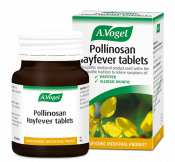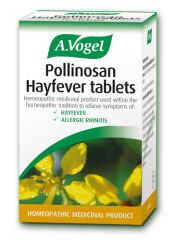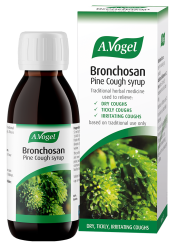Allergic rhinitis and diet
You may find that you react to certain foods whilst suffering from allergic rhinitis that don’t usually cause you any problems. This is because your body produces more adrenaline when it is attempting to fight off allergens and this chemical is not good for the digestive system. So, until your allergic rhinitis subsides, you may have to avoid the foods that are causing you problems, or at least reduce the amount of them that you eat. Also, ensure that when you do eat, you allow plenty of time to chew thoroughly –if you do this in a hurry it’ll just make things worse!
Histamine-rich food and drinks
Histamine is released by the immune system when the body comes into contact with an allergen. This is a defence mechanism used to push out allergens from within the body but it can cause all sorts of problems. This chemical can lead to congestion, inflammation and itching for example, which can be uncomfortable and even painful.
It’s not just the immune system that can produce histamine though – it’s contained in a lot of everyday food and drinks as well. Therefore, from your morning brew to your afternoon snack, what you eat can have a significant impact upon the severity of your allergic rhinitis symptoms.
Alcohol and caffeine

Coffee, tea, wine and beer feature in most people’s day-to-day lives, especially in the summer months when we want to enjoy the long, bright evenings. However, all of these drinks contain high levels of histamine so consuming them on a regular basis has the potential to make symptoms of allergic rhinitis worse.
So, when you experience a flare-up of the condition it’s best to cut these things out of your diet. Why not try a refreshing mocktail or a healthy mango and banana smoothie instead? The latter is rich in antioxidants and contains vitamin C, a natural antihistamine that could actually help your allergic rhinitis symptoms.
Nevertheless, if tea and coffee is more your thing, there’s an alternative for that too! Herbal teas have been shown to be very beneficial for allergic rhinitis sufferers, especially nettle tea. This plant has anti-inflammatory properties and is rich in iron and vitamin C too so it’ll help your allergic rhinitis and provide you with a tasty brew! If you'd like some more information on which foods could help allergic rhinitis have a look at my blog '7 food and drinks that could help allergic rhinitis'.
The western diet

A western diet generally consists of high calorie foods that are low in antioxidants, high in fats and high in refined sugars too. They also contain a lot of artificial colourings so, you’ve guessed it, this isn’t great for allergic rhinitis!
Refined sugars are particularly bad as they are able to turn on adrenaline which works to increase the inflammatory effects of histamine. (1)(2) They also put more demand on the pancreas which, in turn, can contribute to the production of too much mucus. This will only worsen the likes of congestion and a runny nose - two key symptoms of allergic rhinitis.
Again, refined sugars are a part of our day-to-day lives and can be found in many products including:
- Fizzy juice
- Sweets
- Jars of sauce for cooking
- Some cereals (especially those aimed at kids)
- Cakes
- Lattes and hot chocolates
- Ketchup
- Ready meals
- Canned fruit
Instead of consuming lots of these foods, as an allergic rhinitis sufferer it’s best to choose fresh produce such as meat, fish, fruit and vegetables. Not only will these foods provide you with a healthy meal, they are all low in histamine too. Why not be adventurous and try one of our recipes? The lentil ragu with zucchini noodles is a little bit different, as is the tasty mushroom risotto!
Histamine-rich snacks

I’ve mentioned the effects of snacks like chocolate, milkshakes, cakes and sweets on the severity of allergic rhinitis symptoms, but these aren’t the only culprits! You may think you’re being healthy when choosing to nibble on walnuts or cashew nuts but, unfortunately, these are just another of the many foods that contain some degree of histamine.
So, in order to avoid making your stuffy nose or itchy rash worse, these are another thing to cut down on. There are however, plenty of other nuts you can easily switch to including pecan and macadamia. All of these are great for baking and snacking on.
Fermented Foods

As mentioned, fresh fruit and vegetables contain low levels of histamine but nevertheless, it can be present in bacteria that grow around them. Therefore, if these ingredients are aged or preserved it can end up creating a product that contains high levels of histamine. Not only this, other preservatives such as vinegar, yogurt and canned fish can also be problematic.
So, as I said before, fresh is best for any allergic rhinitis sufferer!
Milk-based products

Be wary of dairy! People prone to allergic reactions tend to find that they struggle with dairy because it has the potential to make phlegm thicker. This worsens congestion, blocked ears and a sore head which, in turn, has the potential to interrupt sleep and cause fatigue.
So, this is another food group you should definitely avoid when suffering from allergic rhinitis however, you may be wondering what to have instead. Fortunately, there are a number of alternatives to the mucous-inducing milk, including coconut milk. You can have this straight from the carton as a refreshing, tasty drink or you can add it to a whole host of bakes and hot drinks including coffee and pancakes!
Also, cacao (not coco!) makes a great alternative to chocolate or hot chocolate that’s packed full of histamine and refined sugars.
If you choose to cut out chocolate in order to help your allergic rhinitis symptoms you may begin to miss your usual sweet treat. In this case you could try making our delicious salted cacao and almond butter fudge however, if you’d like a slightly simpler snack, but one that’s no less tasty, our bounty smoothie is a great option too!
Additional help
I’ve discussed how diet can affect allergic rhinitis symptoms, but you may be wondering what else you can do to alleviate symptoms such as a runny nose, itchy eyes and sneezing. Well, we have a range of herbal remedies that may prove beneficial, including our Pollinosan Hayfever Tablets.
Unlike other treatments, these do not leave you with unwanted side effects like drowsiness. Also, these tablets cover all hayfever symptoms so it’s not necessary for people with multiple symptoms to use multiple remedies. With this, and with my advice on how diet can affect your allergic rhinitis symptoms, you’ll be ready to face the problem head on the next time it flares up!
My Top Tip:

Take 2 tablets, 3 times daily before meals. Suitable for adults and children over 12.
"These really help my hayfever. Would recommend to those who can't or don't take antihistamines."






 Looking for a solution to curb those hayfever symptoms such as itchy eyes, constant sneezing and congestion, then look no further than A.Vogel’s Pollinosan Hayfever tablets.
Looking for a solution to curb those hayfever symptoms such as itchy eyes, constant sneezing and congestion, then look no further than A.Vogel’s Pollinosan Hayfever tablets.

